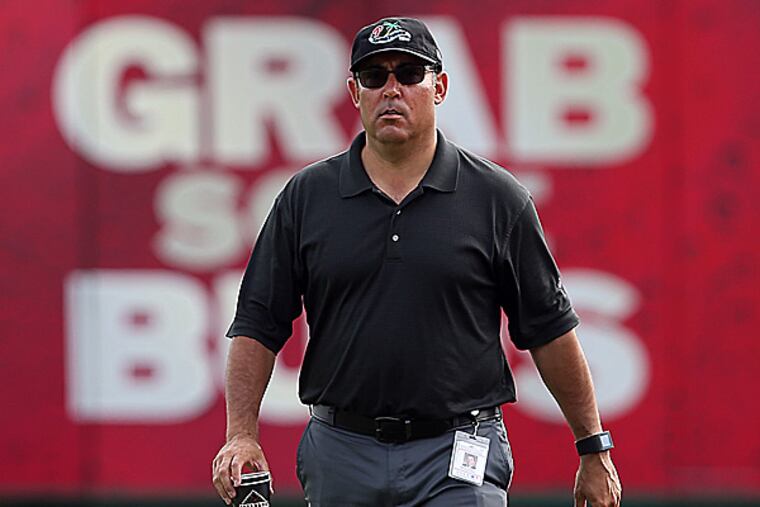From Fall Classic to classic fall guy
Ruben Amaro Jr. seems to get all the blame even though the Phillies' decline is not all his fault.

THE FIRST THING I thought when I read yesterday that $12 million man Miguel Alfredo Gonzalez had cleared waivers was this:
Oh, boy. If Ruben Amaro Jr. wasn't the Phillies' human shield before this, he most certainly is now.
Oh, you thought that was last season? No, Amaro had 2 years left on his contract at the start of last season, and had enough hope in the remaining pieces of his 102-win team of 2011 to say, "I believe in karma, so my thought process is to stay positive. Things are going to go well and . . . we're going to stay healthy enough to be contenders throughout the season and who knows what happens at the end of the year. But we also can't be so blinded to the fact that if this doesn't work out, we're going to have to make some tough decisions."
They are making those decisions now. And one of them is what to do with Ruben - if it hasn't been decided already.
The other day, team president Pat Gillick told MLB.com's Todd Zolecki that he didn't think Amaro would be offered another contract before this one runs out. He also said, "He's the one that gets all the heat, but we've all had a hand in making these decisions. So consequently, I think we all share responsibility."
He can say that because the narrative always describes him as the architect, and Amaro as the maintenance man.
That's one explanation why Amaro is still GM, and hasn't been offered a new contract, even as the old bricks and the ones he tried to shore them up with collapse around him. Because the Phillies are not really poised to rebuild yet. There are still too many old bricks on the ground to dig out, and some faulty ones - like the $12 million man - to discard. And there isn't much new material to take their place. After Gonzalez and perennial disappointment Phillippe Aumont passed through waivers Tuesday, the Phillies offered both jobs pitching in the minor leagues.
Even though Aumont has said that he would prefer a fresh start elsewhere.
Even though Amaro outbid several teams for Gonzalez less than 2 years ago.
That they both are still in the system speaks volumes to the current state of the Phillies' rebuild. Or lack of it.
So why not keep Ruben around a little longer to take a few more bullets? Gillick can say they all had a hand in what has become of this team, and maybe that's true. But it's kind of like saying Pat reaped the fruits of Ed Wade's drafts. You give the credit to the guy running the show when good things happen and you blame that guy when they don't, and for the most part that's appropriate. The Phillies don't win in 2008 without the bricks Gillick added and they don't lose this much over the last two seasons (and the one coming up) if Amaro is right about players like Gonzalez and Aumont, who was a key part of the trade that sent Cliff Lee to Seattle after the near-miss in 2009.
Having just traded prospects away to obtain Roy Halladay, Amaro took the hit then, too, saying he was trying to restock the farm with the deal when the more likely scenario was that the Phillies' ownership group wouldn't, at that point, take on the contracts of two elite pitchers.
Either way, it was an error in judgment that may have cost them in 2010, when they were outpitched in the National League Championship Series by the upstart Giants. That, the negligible returns for star players like Shane Victorino and Hunter Pence in the years that followed, and Amaro's tendency to acquire fading talent at luxury prices have led to the public's overwhelming lack of faith in his ability to engineer a rebuild, or even find appropriate value to the remaining bricks.
So here he is, likely his final season, taking a few more hits while a rumored restructure of the team's ownership is sorted out, while the Phillies essentially position themselves for a run to begin later this decade, or early in the next.
To anyone in their early teens or early 20s who has ever wondered what baseball was like in the late '90s: It was like this. Minus the nice ballpark.
Just try to remember as you are loading another round: The popular narrative that the Phillies slipped each year Ruben was at the helm is, at least statistically, inaccurate. The truth is that the overall impact of the moves Ruben made during that span increased their win totals in each of his first three seasons, and thus, from an oddsmaker's standpoint, the probability of another world championship.
The real narrative was about a lack of key hits from a lineup that might have grown too fond of itself, too complacent, too flawed.
But don't let that get in the way of more target practice. Fire away, what the hey? At this point, it really doesn't matter. When your real job description is human shield, what's another bullet?
On Twitter: @samdonnellon
Columns: ph.ly/Donnellon